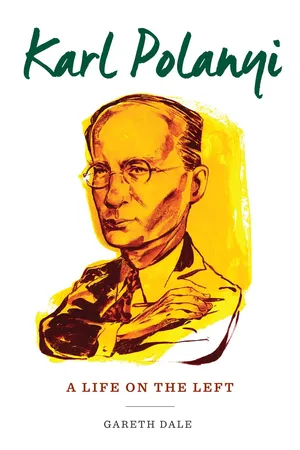![]()
NOTES
ACKNOWLEDGMENTS
1. KPA-54–3, Julius Holló to Polanyi (date unclear).
INTRODUCTION
1. Ferenc Körmendi, The Happy Generation (London: Nicholson & Watson, 1945), 18.
2. Norman Stone, Europe Transformed, 1878–1919 (London: Fontana Paperbacks, 1983), 303.
3. Karl Mannheim and Ernest Gellner, discussed in Stephen Quilley and Steven Loyal, “Wittgenstein, Gellner, and Elias: From the Philosophy of Language Games to a Figurational Sociology of Knowledge,” Human Figurations 2, no. 2 (2013): 2–9.
4. Mary Gluck, Georg Lukacs and His Generation, 1900–1918 (Cambridge, Mass.: Harvard University Press, 1985), 73.
5. At one point, when preparing his British tax return, Polanyi concluded that the Inland Revenue had miscalculated in his favor, upon which he insisted on returning the “small extra sum that he thought he should pay.” (Kari Polanyi-Levitt, interview, December 2008.) This was perhaps true to Polanyi’s nature, although he was not consistent. For example, in 1954 the U.S. Social Security Administration claimed that it had overpaid Polanyi by around one thousand dollars. He tenaciously fought his corner, firing off dozens of letters and statements, over almost a year, and brought in a law firm too. His case was that his salary at Columbia, being funded by the Ford Foundation, did not strictly speaking count as salary and was not therefore taxable income. He lost. (KPA-49–5, Polanyi’s correspondence from 1956; also KPA-30–12, D. J. Plitz, 1963, to Karl Polanyi [n.d.].) The incident was not without irony, given that Henry Ford had created the Foundation to avoid inheritance tax.
6. Otto Bauer, Werkausgabe, vol. 2 (Vienna: Europa Verlag, 1976), 329.
7. For example, Ross Terrill, R. H. Tawney and His Times: Socialism as Fellowship (Cambridge Mass.: Harvard University Press, 1973), 128.
8. Georg Lukacs, “The Standpoint of the Proletariat,” in History and Class Consciousness (London: Merlin, 1967 [1919–1923]), 63–95. See also Jan Rehmann, Theories of Ideology: The Powers of Alienation and Subjection (Leiden: Brill, 2013), 80.
9. Karl Mannheim, Man and Society in an Age of Reconstruction (London: Routledge, 1940), 157.
10. Michael Polanyi, Personal Knowledge: Towards a Post-Critical Philosophy (London: Routledge & Kegan Paul, 1958).
11. Jefferson Pooley, “An Accident of Memory: Edward Shils, Paul Lazarsfeld and the History of American Mass Communication Research” (D.Phil., Columbia University, 2006), 130.
12. Michael Polanyi, The Tacit Dimension (Garden City, N.Y.: Doubleday, 1966), 86.
13. Karl Polanyi, The Great Transformation: The Political and Economic Origins of Our Time (Boston: Beacon, 2001), 102.
14. KPA-17–24, Karl Polanyi, “Rise and Decline of the Profit Motive,” London Cooperative Society Weekend School.
15. Blaise Bachofen, “Why Rousseau Mistrusts Revolutions: Rousseau’s Paradoxical Conservatism,” in Rousseau and Revolution, ed. Holger Ross Lauritsen and Mikkel Thorup (London: Continuum, 2011), 35–61.
16. This insight has more recently been developed by the political philosopher Ruth Grant, in Strings Attached: Untangling the Ethics of Incentives (Princeton, N.J.: Princeton University Press, 2011).
17. Ernest Gellner, Nations and Nationalism (Ithaca, N.Y.: Cornell University Press, 1983). For a critique of “Great Ditch” theories, see Bruno Latour, We Have Never Been Modern (Cambridge, Mass.: Harvard University Press, 1993).
18. KPA-51–2, Karl Polanyi to George, August 6, 1960.
19. MPP-17–12, Karl Polanyi to Misi, January 21, 1957.
20. Typewritten memoir by Don Grant, shared with the author, September 2013.
21. William Scott and Martin Moleski, Michael Polanyi: Scientist and Philosopher (Oxford: Oxford University Press, 2005), 9.
22. Peter Drucker, Adventures of a Bystander (New York: John Wiley, 1994 [1978]), 134.
23. Collini, cited in Denys Leighton, The Greenian Moment: T. H. Green, Religion and Political Argument in Victorian Britain (Exeter: Imprint Academic, 2004), 28. See also Peter Thomas, The Gramscian Moment (Leiden: Brill, 2009), 128.
24. Godesberg Programme of the SPD, November 1959, http://germanhistorydocs.ghi-dc.org/docpage.cfm?docpage_id=3341.
25. KPA-30–2, Karl Polanyi to Bé de Waard, January 6, 1958.
1. IN THE EAST-WEST SALON
1. SPSL-536–1, Karl Polanyi to Walter Adams, March 31, 1934.
2. See for example the letterheads in PFP-212–28: “The Pollacsek family were wealthy country folk who rented crown property for their business in the 18th century.” Jean Richards, e-mail to the author, May 28, 2013.
3. Kari Polanyi-Levitt, telephone interview, November 2008.
...
